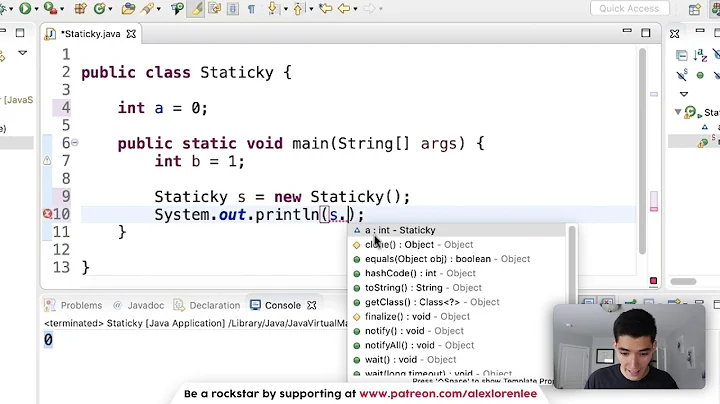Java - using AtomicInteger vs Static int
Solution 1
- AtomicInteger is used to perform the atomic operation over an integer, its an alternative when you don't want to use synchronized keyword.
- Using a volatile on a Non-Atomic field will give inconsistent result.
int volatile count;
public void inc(){
count++
}
- static will make a variable shared by all the instances of that class, But still it will produce an inconsistent result in multi-threading environment.
So try these when you are in multithreading environment:
1. Its always better to follow the Brian's Rule:
When ever we write a variable which is next to be read by another thread, or when we are reading a variable which is written just by another thread, it needs to be synchronized. The shared fields must be made private, making the read and write methods/atomic statements synchronized.
2. Second option is using the Atomic Classes, like AtomicInteger, AtomicLong, AtomicReference, etc.
Solution 2
I agree with @Kumar's answer.
Volatile is not sufficient - it has some implications for the memory order, but does not ensure atomicity of ++.
The really difficult thing about multi-threaded programming is that problems may not show up in any reasonable amount of testing. I wrote a program to demonstrate the issue, but it has threads that do nothing but increment counters. Even so, the counts are within about 1% of the right answer. In a real program, in which the threads have other work to do, there may be a very low probability of two threads doing the ++ close enough to simultaneously to show the problem. Multi-thread correctness cannot be tested in, it has to be designed in.
This program does the same counting task using a simple static int, a volatile int, and an AtomicInteger. Only the AtomicInteger consistently gets the right answer. A typical output on a multiprocessor with 4 dual-threaded cores is:
count: 1981788 volatileCount: 1982139 atomicCount: 2000000 Expected count: 2000000
Here's the source code:
import java.util.ArrayList;
import java.util.List;
import java.util.concurrent.atomic.AtomicInteger;
public class Test {
private static int COUNTS_PER_THREAD = 1000000;
private static int THREADS = 2;
private static int count = 0;
private static volatile int volatileCount = 0;
private static AtomicInteger atomicCount = new AtomicInteger();
public static void main(String[] args) throws InterruptedException {
List<Thread> threads = new ArrayList<Thread>(THREADS);
for (int i = 0; i < THREADS; i++) {
threads.add(new Thread(new Counter()));
}
for (Thread t : threads) {
t.start();
}
for (Thread t : threads) {
t.join();
}
System.out.println("count: " + count + " volatileCount: " + volatileCount + " atomicCount: "
+ atomicCount + " Expected count: "
+ (THREADS * COUNTS_PER_THREAD));
}
private static class Counter implements Runnable {
@Override
public void run() {
for (int i = 0; i < COUNTS_PER_THREAD; i++) {
count++;
volatileCount++;
atomicCount.incrementAndGet();
}
}
}
}
Solution 3
With AtomicInteger the incrementAndGet() guaranteed to be atomic.
If you use count++ to get the previous value it is not guaranteed to be atomic.
Something the I missed from your question - and was stated by other answer - static has nothing to do with threading.
Solution 4
"static" make the var to be class level. That means, if you define "static int count" in a class, no matter how many instances you created of the class, all instances use same "count". While AtomicInteger is a normal class, it just add synchronization protection.
Solution 5
static int counter would give you inconsistent result in multithreaded environment unless you make the counter volatile or make the increment block synchronized.
In case of automic it gives lock-free thread-safe programming on single variables.
Related videos on Youtube
user547453
Updated on October 09, 2022Comments
-
user547453 over 1 year
While using multiple threads I have learnt to use Static variables whenever I want to use a counter that will be accessed by multiple threads.
Example:
static int count=0;Then later in the program I use it ascount++;.Today I came across something called
AtomicIntegerand I also learned that it is Thread safe and could use one of its methods calledgetAndInrement()to achieve the same effect.Could anyone help me to understand about using
static atomicIntegerversusstatic int count?-
Bhesh Gurung over 11 years
staticdoesn't have anything to do with multi-threading.
-
-
Itay Karo over 11 yearsit means, for example, that if two threads are using, for example
prevCount = count++on the same time, it might be that both of the thread will get the same value of prevCount. -
Patricia Shanahan over 11 yearsI don't think volatile is enough to make ++ safe.








